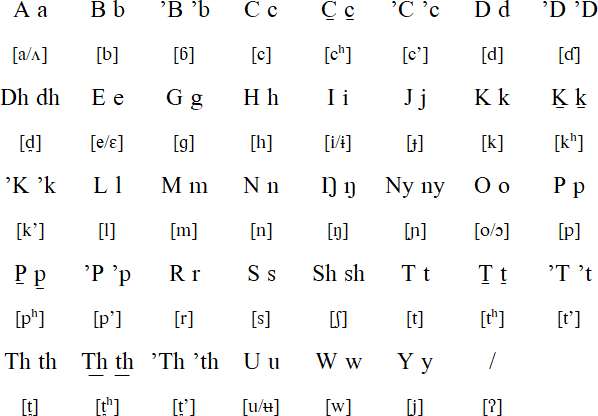Uduk is a member of the Koman branch of the Nilo-Saharan language family. It is spoken in Sudan and South Sudan by about 22,000 people. In Sudan it is spoken in the Kurmuk district of Blue Nile state in the southeast of the country. In South Sudan it is spoken in Mabaab county in Upper Nile State in the northwest of the country. Due to civil wars in Sudan, many Uduk people fled to refugee camps in Ethiopia and South Sudan.
The Koman languages are believed by some linguists to be part of the Nilo-Saharan language family, however there is little evidence for this.
Uduk is also known as Kebeirka, Korara, Kumus, Kwanim Pa or Othan. The native name of the language, ʼTwāmpā, means 'mouth of the home'. There are three dialect of Uduk: two northern dialect, Chali and Bellila, and one southern dialect, Yabus. The main differences between the dialects are in pronunciation and grammar.
Uduk was first written in the 1950s, and a standard way of writing it was developed by missionaries. It is currently used in some schools.

Uduk has two tones: a high tone, which is indicated with an acute accent (á), and a low tone.
Download an Uduk alphabet chart (Excel)
Aris ꞌkwaninyꞌceshi ꞌbaar mo dhoꞌthkunu ꞌbaḵany mo dhali mmomiiya ṯuꞌc imonṯal ꞌde/ mo dhali mii ma ḵar/e mo. Uni mini ta gi gwo mo dhali mii mo dhali uni mini mii ka karambuye/ ꞌkup̱ ki cin tiya mo e shi/in mo dhali mii kun tanu ikam mo.
All human beings are born free and equal in dignity and rights. They are endowed with reason and conscience and should act towards one another in a spirit of brotherhood.
(Article 1 of the Universal Declaration of Human Rights)
Information about Uduk
https://en.wikipedia.org/wiki/Uduk_language
https://www.ethnologue.com/language/udu
https://www.academia.edu/
Daza, Fur, Gumuz, Kanuri, Komo, Lokoya, Nobiin, Shilluk, Uduk, Zaghawa, Zarma
Languages written with the Latin alphabet
Page last modified: 27.07.24
[top]
You can support this site by Buying Me A Coffee, and if you like what you see on this page, you can use the buttons below to share it with people you know.

If you like this site and find it useful, you can support it by making a donation via PayPal or Patreon, or by contributing in other ways. Omniglot is how I make my living.
Note: all links on this site to Amazon.com, Amazon.co.uk
and Amazon.fr
are affiliate links. This means I earn a commission if you click on any of them and buy something. So by clicking on these links you can help to support this site.
[top]